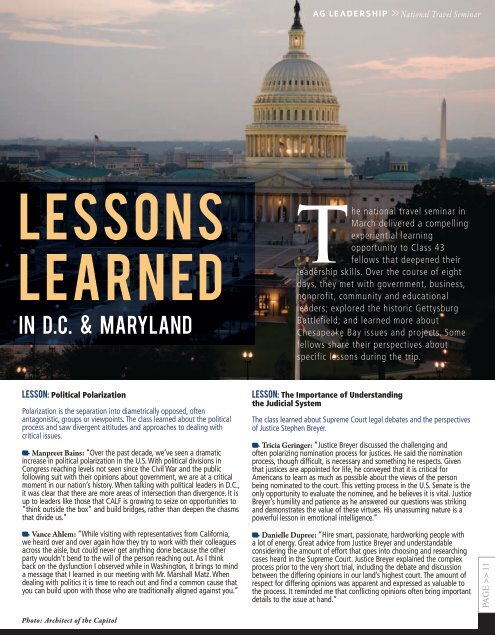hori zons
Champions of Ag Leadership - California Agricultural Leadership ...
Champions of Ag Leadership - California Agricultural Leadership ...
- No tags were found...
Create successful ePaper yourself
Turn your PDF publications into a flip-book with our unique Google optimized e-Paper software.
AG LEADERSHIP >> National Travel Seminar<br />
Lessons<br />
Learned<br />
in D.C. & Maryland<br />
The national travel seminar in<br />
March delivered a compelling<br />
experiential learning<br />
opportunity to Class 43<br />
fellows that deepened their<br />
leadership skills. Over the course of eight<br />
days, they met with government, business,<br />
nonprofit, community and educational<br />
leaders; explored the historic Gettysburg<br />
Battlefield; and learned more about<br />
Chesapeake Bay issues and projects. Some<br />
fellows share their perspectives about<br />
specific lessons during the trip.<br />
Lesson: Political Polarization<br />
Polarization is the separation into diametrically opposed, often<br />
antagonistic, groups or viewpoints. The class learned about the political<br />
process and saw divergent attitudes and approaches to dealing with<br />
critical issues.<br />
Manpreet Bains: “Over the past decade, we’ve seen a dramatic<br />
increase in political polarization in the U.S. With political divisions in<br />
Congress reaching levels not seen since the Civil War and the public<br />
following suit with their opinions about government, we are at a critical<br />
moment in our nation’s history. When talking with political leaders in D.C.,<br />
it was clear that there are more areas of intersection than divergence. It is<br />
up to leaders like those that CALF is growing to seize on opportunities to<br />
“think outside the box” and build bridges, rather than deepen the chasms<br />
that divide us.”<br />
Lesson: The Importance of Understanding<br />
the Judicial System<br />
The class learned about Supreme Court legal debates and the perspectives<br />
of Justice Stephen Breyer.<br />
Tricia Geringer: “Justice Breyer discussed the challenging and<br />
often polarizing nomination process for justices. He said the nomination<br />
process, though difficult, is necessary and something he respects. Given<br />
that justices are appointed for life, he conveyed that it is critical for<br />
Americans to learn as much as possible about the views of the person<br />
being nominated to the court. This vetting process in the U.S. Senate is the<br />
only opportunity to evaluate the nominee, and he believes it is vital. Justice<br />
Breyer’s humility and patience as he answered our questions was striking<br />
and demonstrates the value of these virtues. His unassuming nature is a<br />
powerful lesson in emotional intelligence.”<br />
Vance Ahlem: “While visiting with representatives from California,<br />
we heard over and over again how they try to work with their colleagues<br />
across the aisle, but could never get anything done because the other<br />
party wouldn’t bend to the will of the person reaching out. As I think<br />
back on the dysfunction I observed while in Washington, it brings to mind<br />
a message that I learned in our meeting with Mr. Marshall Matz. When<br />
dealing with politics it is time to reach out and find a common cause that<br />
you can build upon with those who are traditionally aligned against you.”<br />
Danielle Dupree: “Hire smart, passionate, hardworking people with<br />
a lot of energy. Great advice from Justice Breyer and understandable<br />
considering the amount of effort that goes into choosing and researching<br />
cases heard in the Supreme Court. Justice Breyer explained the complex<br />
process prior to the very short trial, including the debate and discussion<br />
between the differing opinions in our land’s highest court. The amount of<br />
respect for differing opinions was apparent and expressed as valuable to<br />
the process. It reminded me that conflicting opinions often bring important<br />
details to the issue at hand.”<br />
PAGE >> 11<br />
Photo: Architect of the Capitol




